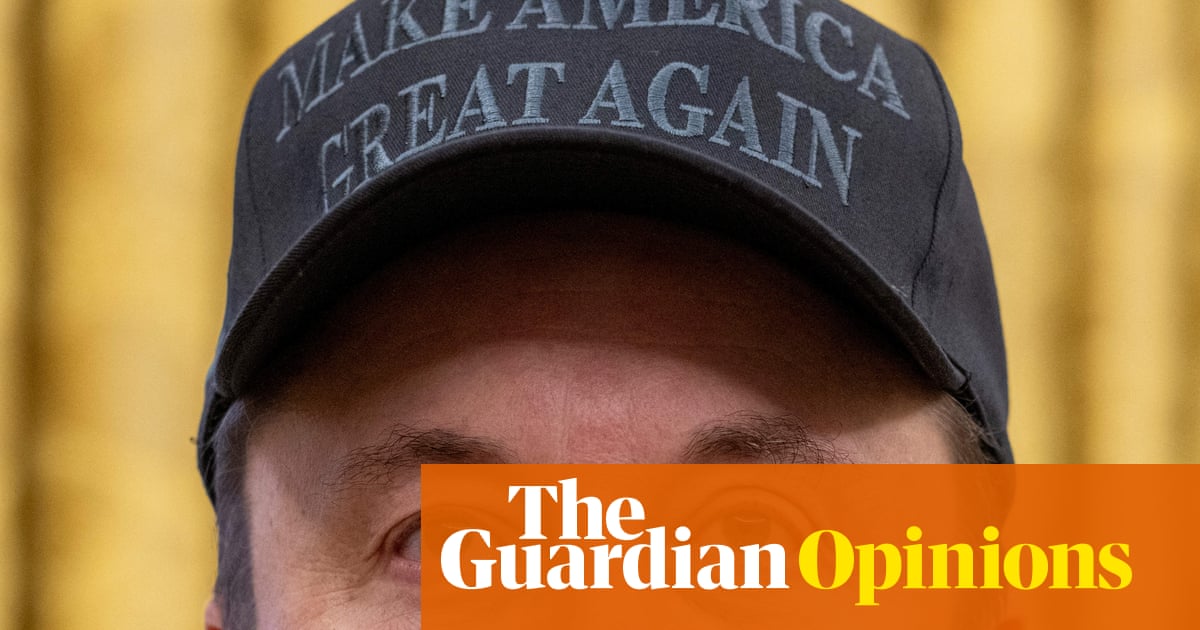Ican’t believe thatElon Musk is leaving Doge, the government department he named after a tired and basic meme that most of the internet had moved on from around a decade ago. “As my scheduled time as a Special Government Employee comes to an end,”Musk wrote this week(capital letters: model’s own), “I would like to thank President @realDonaldTrump for the opportunity to reduce wasteful government spending.” Oh man. “Thank you for the opportunity”?! At some level you have to salute Donald Trump’s ability to turn even the world’s richest man into an Apprentice candidate who leaves in week four after completely wiping out in the hotdog stand task.
Musk arrived in government promising toslash spending by $2tn. He leaves it a mere $1.86tn short of that target, even by his own estimations. Meanwhile, the president’s new tax bill is set to add $2.3tn to the deficit. I imagine Musk thought his government finale would be a spectacular extravaganza – “you’re welcome, Washington!” – involving 2,000 chainsaw-wielding chorus girls. Instead, it’s a tweet. And yes – we DO all still call them tweets.
Ironically, the thing that Musk has been most stunningly effective at slashing is his own reputation. Think about it. He arrived in Trump’s orbit as a somewhat mysterious man, widely regarded as a tech genius, and a titan of the age. He leaves it with vast numbers of people woken up to the fact he’s a weird andcreepy breeding fetishist, who desperately pretends to be good at video games, and wasn’t remotely as key to Space X or Tesla’s engineering prowess as they’d vaguely thought. Also, with a number of them apparently convinced he had a botched penile implant. Rightly or wrongly convinced – sure. I’m just asking questions.
But look, it’s good news for Tesla investors, who have managed to end Musk’s practice of WFWH (working from White House), and are now demandinghe puts in a 40-hour weekto save the company whose stock he has spent the past few months tanking. As the world order dramatically seeks to rearrange itself in the new era of US unreliability, no one should ever be able to unsee the president of the United States’s decision to turn the White House lawn into acar sales lot for his sad friend. Did it work? It seems not. Musk spent a lot of this week airing his hurt feelings about his brrm-brrm cars. “People were burning Teslas,”he whinedto Jeff Bezos’s Washington Post this week. “Why would you do that? That’s really uncool.”
Well, one thing we will no longer have to endure is this guy’s decrees on what is or isn’t cool. The timeworn thing about money and power is that they allow nerds to reinvent themselves as cool. You see it on Wall Street, where sea-beast financiers get manscaped by trophy wives who are no longer out of their league. You see it in Hollywood, where weird little guys become alpha movie producers. You see it inBezos’s transformationfrom puffy-chinos-wearing, dress-down-Friday dweeb to Bilderberg Vin Diesel impersonator. What you rarely see is the alchemy of that process in reverse, live and in real time. But we got that with Elon, and we have to take our laughs where we can. In some other businesses, Musk could have convinced himself it wasn’t happening, but politics is a place where pollsters literally ask real people what they think of public figures every single week. Elon’sapproval ratingsare underwater.
No doubt we’re this close to him identifying the real problem: that we simply need new voters. Musk has long been convinced that people don’t know how to handle his genius in all fields. Four years ago, he hosted Saturday Night Live, and sometime afterwardsrevealed on a podcasthow the cast and writers had reacted to the uncontainably hilarious suggestions made by him and his team of bros. “We come in just, like, guns blazing with ideas,” he honked, explaining he’d pitched a … bit, is it? … where he was “going to take my cock out. So I’m going to reach down into my pants … and then I pull out a baby rooster. Like, ‘This is my tiny cock.’” Oh very good, sir. Absolute genius, sir. Presumably terrified that they would lose their jobs forever to this superlative talent, the SNL team declined to “yes-and” this genius sketch into the final show running order, but Musk managed to get his own back – at least in his account of hosting an episode with aflattering 13% ratingon Rotten Tomatoes. “There’s a bunch of things that I said that were just not on the script. They have these cue cards for what you’re supposed to say, and I just didn’t say it. I just went off the rails.”
Mm. Just like you have now. As for where Musk goes next, he’s obviouslybuilding a Texan compoundfor the mothers of his many babies. But, psychologically, Mars would seem to be the answer. After a humiliation this big, only colonising another planet feels like the appropriately sized salve. It doesn’t matter that Mars is an obvious shithole that looks like the least appealing disused quarry on Earth – a place so bleak and empty that if they found one single fossilised flower it would be celebrated like the holy grail, even though the impossible majesty of the Amazon rainforest is right here. But of course, the point of Mars is that it would be the place of Elon, Teslamandias, king of kings. And you know, I feel more confident than ever that we could all look upon his works and despair.
Marina Hyde is a Guardian columnist
